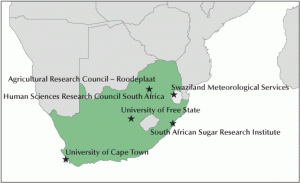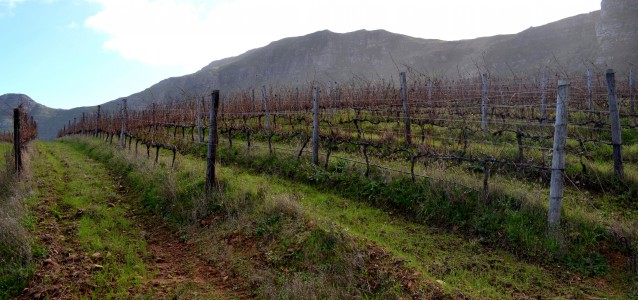 CSAG has been contributing to a project whereby an expert team of climate, crop, economic, and IT research scientists in Southern Africa are evaluating the impact of climate change on the production and prices of important crops. A simultaneous goal within the project is to build human and institutional capacity to explore and evaluate these impacts and associated field management adaptation strategies on food prices and production.
CSAG has been contributing to a project whereby an expert team of climate, crop, economic, and IT research scientists in Southern Africa are evaluating the impact of climate change on the production and prices of important crops. A simultaneous goal within the project is to build human and institutional capacity to explore and evaluate these impacts and associated field management adaptation strategies on food prices and production.
The project team is testing the accuracy of models for staple crops, using these models to estimate regional-scale food production for the period of 2070–2099 for the IPCC’s A2 climate and development scenario, identifying field-level adaptation strategies for maintaining or increasing yields, and evaluating economic impacts of climate change on different farming systems. This knowledge will build capacity across the disciplines of climate, crop, and economic modeling in the region.
The AgMIP Southern Africa Project is coordinated by Dr. Y. Beletse of South Africa Agricultural Research Council –Roodeplaat, with assistance from Dr. O. Crespo of the Climate System Analysis Group, and S. Walker of University of Free State. Key researchers include Dr. W. Durand of South Africa Agricultural Research Council – Potchefstroom; A. Singels of South African Sugar Research Institute; C. Nhemachena of Human Sciences Research Council South Africa; and M.S. Gamedze of Swaziland Meteorological Services.
The impacts evaluation and capacity-building activities are anticipated to result in validated crop models for maize, sorghum, sugarcane, wheat, and sweet potatoes— the staple and nutritionally important crops in Southern Africa. Inter-comparison of model outputs is likely to lead to improvement of the models. Estimated productivity levels from crop models will be used as inputs to economic models to enable simulation of economic outcomes for different farming systems given a range of climate change scenarios. The integrated analysis of outputs from linked climate, crop and economic modeling enables the assessment of a range of possible future socio-economic pathways. It also builds critical capacity among the team members in methodologies for conducting integrated assessments that will be shared locally through targeted workshops, meetings, training, and stakeholder outreach.
For more information with regards to this project contact Olivier Crespo
